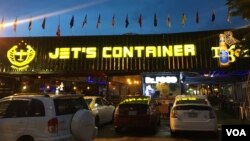A new million-dollar night market in Phnom Penh has become a fashionable hang out spot for young Cambodians, but in 2009 the Dey Krahorm community was violently expelled from the area and their homes razed in one of Cambodia’s most high profile forced evictions.
Opposite the Russian Embassy, the new Jet’s Container Market is home to dozens of colorful shipping containers converted to restaurants, bars, and shops.
Korng Sothearo, 30, a small business owner, says he goes at least five times a week. “It’s a fun neighborhood and perfect for this kind of nightlife,” he said, adding that he thinks the success of Jet’s meant it would expand in the future.
Bands perform into the evenings atop the containers while bars serve copious amounts of beer and restaurants dish up local specialties.
Chao Chay Yi, 20, a business student, said she had “only seen this kind of place in other countries”.
The project manager at Jet’s, Chhay Sophorn, says Jet’s Group, owned by Cambodian conglomerate 7NG, spent about $1 million renovating the 1-hectare site. It opened with 320 stalls in February.
“It helps the economy and brings a new attraction to the town,” Sophorn said. “It operates in a different format to other markets. Here, we have pubs and bars that appeal to foreigners.”
The 7NG company, owned by Srey Sothea, took control of the Dey Krahorm area in 2009. The area was supposed to be turned into a social land concession, meaning that it would be developed by a private corporation, which would then given much of the land to the poor.
However, Chan Vicheth, 39, a former resident of Dey Krahorm, says the community was never supportive of the plan for a market. “It was a place where we suffered. Dreadful memories are everywhere and to go there to have fun is such an offense to the former residents,” he said.
“They [military police] came in the middle of the night and smashed our houses to pieces. We couldn’t even keep a single spoon.”
The residents were told to move some 16 kilometers outside the city following the state-corporate raid on their homes.
Vann Sophath, a business and human rights project coordinator at the Cambodian Center for Human Rights, said development in Cambodia rarely met human rights standards.
“This is development through violence, making citizens cry. It’s very sorrowful,” he said.
He added that investors should follow the law and best practices when considering investing in a project.
“In hope, the government and the company re-think their commitment to human rights law and the longevity of development as well,” he said.
In Boeung Kak, the site of another infamous forced eviction, another container market, Art’s Container Market, opened in August.
Chay Yi, the business student, thinks it is better to develop areas such as Dey Krahorm, rather than leave them to their original residents.
“I think this is the way of development of the country, because that area is downtown in Phnom Penh, so it doesn’t look good if they kept it,” he said.








